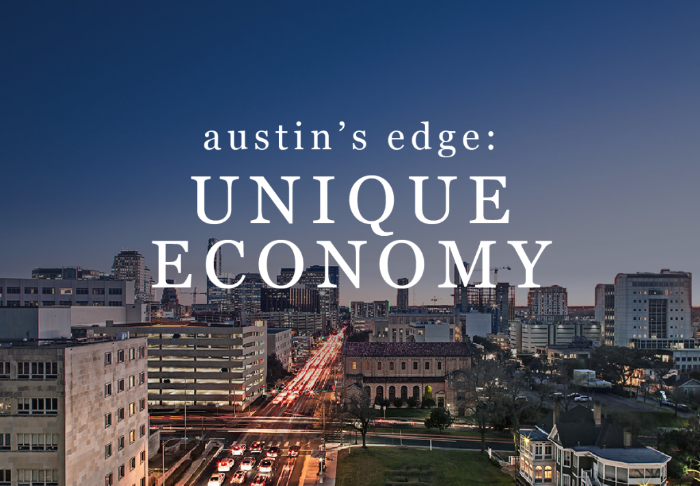
The national news is full of economic stories that include sharp drops in oil and energy prices, volatility in overseas economies and uncertainty in the US job market. However, the local economy in Austin does not seem to be affected by these events, remaining strong and continuing to receive positive economic forecasts. What makes Austin different?

Austin is the only city in the United States with 400,000 university students within a 100 mile radius. College graduates make up more than 41% of the adult population in Austin, and nearly half of the city’s population is between 18 and 44 years old. This provides a highly desireable “Human Capital” component to the economy – meaning there is a large base of well educated people. In turn, this attracts companies looking for a solid work force.
The Human Capital component will continue to grow with the creation of the Dell Medical School at the University of Texas. Not only does it increase the number of students in the area, it is creating an entire new sector in the economy, the biomedical field. Mike Rollins of Opportunity Austin, says, “The new Medical School will provide endless business investment opportunities in Austin as it attracts the medical field’s top talent such as medical technology companies, medical studies and their teams, research labs, and more. It will be the leading medical center in the nation.”

One of the strongest factors to Austin’s growth is that Austin is not a single sector economy. The city’s economic development strategy combines traditional economic development with redevelopment, global business recruitment, small business development, music and cultural arts. Austin has made diversification a key component of the city’s economic development plan.
The goal, which has proven successful to date, is to ensure that if one economic sector sees a downturn, the city as a whole will feel less of an impact as it does not rely solely on that sector. The city of Austin focuses on six target industries for successful growth: Advanced Manufacturing, Clean Energy and Power Technologies, Corporate Headquarters, Data Management, Life Sciences, and Creative & Digital Media.

The arts have played a major role in the diversification of Austin’s economy, growing by 25% over the last 10 years. Austin plays host to a breadth of talent-rich companies in the fields of production, animation, and visual effects for film and television, music and technology, video game development and interactive software creation. Further, the city of Austin continues to welcome 50,000 visitors from 82 countries to participate in the technology and music festival South by Southwest every year. Rollins attributes SXSW as, “The greatest contributing factor to opening Austin to international business.”

Austin has made a name for itself socially as a city that “keeps it weird”. However, in an economic context, Austin has kept itself open and engaged as well. Austin is a young, smart and successful city with boundless energy and creative ideas. “In other cities, people give negative reactions to new ideas. In Austin, there is a positive response, typically comprised of a collaborative idea or a networking opportunity,” says Kevin Johns, the Economic Development Director for the City of Austin. Mr. Johns credits this as Austin’s #1 selling point. This fostering of innovation adds to the draw of not only potential employers but additional human capital, further fueling the appeal to employers. “Austin attracts the creative class without prejudice. We bring smart people and let them do their thing,” adds Johns.
This positivity and optimistic outlook spread to other facets of life in Austin as well. Angelos Angelou of AngelouEconomics states, “The biggest achievement of Austin is empowering young people as a city.” This has led to a citizenship that is truly engaged in the city and committed to keeping it great, while raising it to the next level. Austin’s open mindedness and encouraging community have lead to its economic strength – adding 34,900 jobs in 2015.

